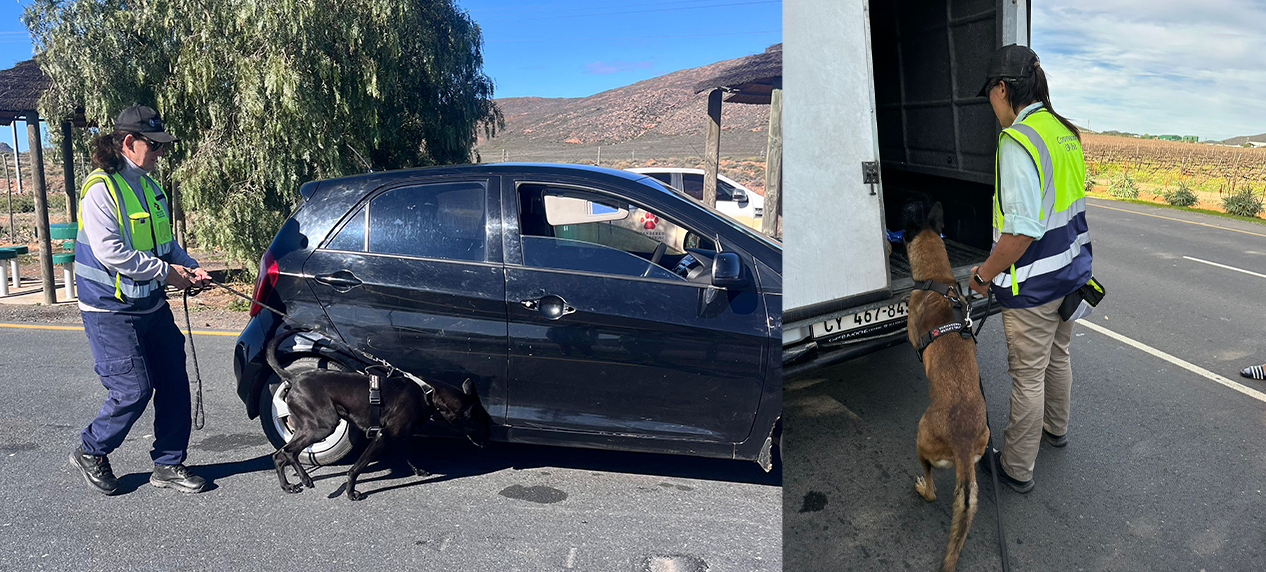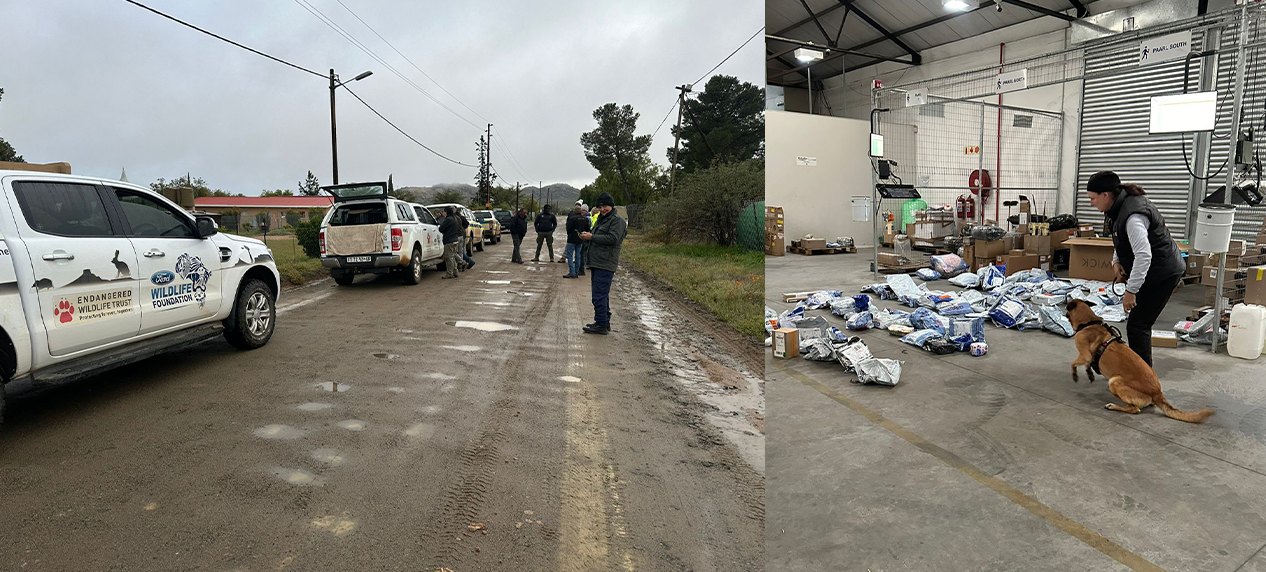EWT Conservation Canines show their worth during police operations
By Eleanor Momberg

Reaper and Shadi (left) and Mufasa and Cat (right) searching vehicles at Roadblocks
The Endangered Wildlife Trust’s Canine Conservation Unit recently showed their worth during a joint security operation in the Western and Northern Cape to address the illegal plant trade.
Between 24 June and 12 July, EWT dog handlers Shadi Henrico, Cliantha (known as Cat) Kay and Esther Mathew, accompanied by five working dogs—Ike, Reaper, Kisha, Mufasa and Delta—supported the SA Police Service, the Border Management Agency, provincial environmental departments and Green Scorpions in operations.
This involved travelling more than 7,000 kms in travel over the three-week period, during which they provided support at two vehicle checkpoints, five roadblocks and six vehicle patrols, searching more than 150 vehicles in areas such as Ashton, Touwsrivier, Kamieskroom and Garies. During these roadblocks, they detected licensed firearms being transported by their owners, and a number of other plant species being transported across the provinces. They also search eight Courier Guy parcel depots and kiosks in Worcester, Swellendam, Robertson, Vredendal and Springbok.
The importance of efforts by the police, the Green Scorpions and provincial conservation bodies, supported by the EWT, cannot be overemphasised at a time when succulent and bulb plant poaching is on the increase in the Northern and Western Cape. Saving succulent species from extinction is becoming more difficult, especially since many of the Conophytum species are hard to grow.
Information published by Traffic, the wildlife trade monitoring organisation, indicates that more than one million succulents have been illegally harvested in South Africa since 2019. This represents “650 different species” which have been seized by authorities.
The Succulent Karoo, spanning the Western, Eastern and Northern Cape, is the most diverse succulent hotspot in the world, and it is under significant threat from escalating poaching of endemic succulent plants that are prized by collectors in Asia and Europe. It is home to more than 6,000 succulent species, of which around 40% are endemic.
These plants are small and inconspicuous and can be easily hidden in parcels and transported by road and air. Poachers are known to rely on existing postal networks, including private courier companies, to move poached plants across the country to ports of exit.
The EWT presently has five dogs trained and able to detect four of the 10 succulent plant species. But, they are able to indicate the presence of other Conophytum species targeted by poachers.
Plant poaching is often associated with other types of crime, including stock theft. By remaining flexible and responsive, we were able to assist the SAPS with a variety of operations throughout the region, acting on the intel they received. Logistically, this meant a lot of packing up and settling dogs into new environments, something which our handlers did very well.
It must be mentioned that not all activity was linked to finding criminals. During the first week in the Western Cape, the K9s received additional and refresher training to keep their noses primed for the detection of plant and animal species that are being illegally traded.
Besides a demonstration of their skills to detect tortoises and conophytums in McGregor, Ike, Kisha, Mufasa, Reaper, and Delta refreshed their scent detection of conophytums, the succulent species most illegally traded in South Africa at present, during training at the Worcester Botanical Gardens. The following day, the canines visited Exotic Animal World in the Western Cape to receive training on live Armadillo Girdled Lizards. This was the first time Mufasa’s detection skills on a live Armadillo Girdled Lizard were tested, impressing Cliantha, his handler.
At the Namaqua National Park, Shadi, with Reaper and Ike, and Cat, with Mufasa and Kisha, assisted at roadblocks along routes regularly used by plant and reptile poachers, and supported in vehicle searches inside the Park.
The EWT K9 Unit will continue working our dogs on the most relevant illegally harvested plant species to support the authorities in the best way possible. We aim to reduce poaching activities through the interception of illegally harvested plants, thereby disrupting the supply chain, assisting law enforcement agencies in their duties and ultimately bringing criminals to justice.

Right: Kisha doing parcel searches
The EWT’s Canine Conservation Unit (CCU) is a special project established to support the conservation efforts of the EWT through scent detection and tracking dog services. The unit is also available as a service provider to our conservation partners, private landowners and other stakeholders, where dogs can perform a variety of priority conservation-focused tasks. This is further supported by the EWT through handler training and certification. There are two types of work done by the EWT’s K9 unit. Anti-poaching dogs are trained to track people, locate snares, find arms and ammunition, and help with the detection of evidence at crime scenes. Our detection dogs are capable of detecting various plant and animal samples, and thus have a wide range of possible conservation benefits and applications. In addition to working to detect the illegal export of particularly wildlife products at O R Tambo International Airport (ORTIA), we are continuously exploring new roles for our conservation canines to ensure that the EWT remains recognised as an industry leader in the field of working dogs.
